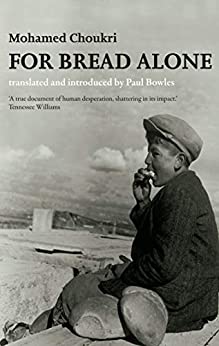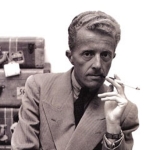Background
Choukri was born on July 15, 1935, in Beni Chiker, Morocco. Born into poverty in the Rif mountain region of Morocco, in 1942 Choukri was sold by his father to another man, who put the boy to work at a Tangier cafe.


(Driven by famine from their home in the Rif, Mohamed's fa...)
Driven by famine from their home in the Rif, Mohamed's family walks to Tangier in search of a better life. But things are no better there. Eight of Mohamed's siblings die of malnutrition and neglect, and one is killed by his father in a fit of rage. On moving to another province Mohamed learns how to charm and steal, and discovers the joys of drugs, sex and alcohol. Proud, insolent and afraid of no one, he returns to Tangier, where he is caught up in the violence of the 1952 independence riots. It is here, during a short spell in a filthy Moroccan jail, that a fellow inmate kindles Mohamed's life-altering love of literature.
https://www.amazon.com/Bread-Alone-Mohamed-Choukri-ebook/dp/B007XF8L1A/ref=sr_1_1?dchild=1&keywords=Mohamed+Choukri&qid=1605259904&sr=8-1
1973
Choukri was born on July 15, 1935, in Beni Chiker, Morocco. Born into poverty in the Rif mountain region of Morocco, in 1942 Choukri was sold by his father to another man, who put the boy to work at a Tangier cafe.
Choukri received no education until he was twenty-one years old, but he eventually learned to read and write.
Choukri became a professor of Arabic in Tangier from 1960 to 1981. His first book, For Bread Alone, told of his early hardships in Tangier, and its honest confessions and stories of drug dealers, prostitution, and other crimes violated so many religious taboos in Morocco that it was banned. However, the book soon received a wide audience in Europe and America, and it was eventually published in Morocco, too. In addition to this book, Choukri was most famous for his close friendships with authors Jean Genet and Tennessee Williams, who often visited him on their trips to Tangier. Choukri recorded their encounters in his books Jean Genet in Tangier (1973), T. Williams in Tangier (1973), and Jean Genet et Tennessee Williams à Tanger (1992), which critics have found notable for their perceptive insights into these famous authors.
Although his more recent works are not as well known, Choukri continued to publish throughout his life, including two sequels to his memoir: The Time of Errors and Faces, Loves, Curses. He was also the author of the short-story collection The Tent (1984), the novel Socco Chico (1986), and the more recent books Street-wise (1996) and Al-Khaymah: Isas (2000).
Choukri believed he had secured that which was most important to him: a posthumous home for his literary work. His last will and testament, in which he left his entire estate to a foundation that was to be run jointly by five presidents. Securing his literary legacy was of the utmost importance to Choukri, but the promises that were made to him were not kept.
Choukri is best known as a Moroccan writer who made an important contribution to the renewal of literature in the Arabic world. Internationally, he is one of the best-known Arab writers, mainly due to his relationship with Paul Bowles, who was his mentor and translator into English. Choukri introduced major changes in Arabic literature, in terms of both the topics selected and the language used, combining classical Arabic with the Moroccan dialect.
(Driven by famine from their home in the Rif, Mohamed's fa...)
1973
